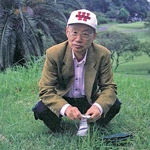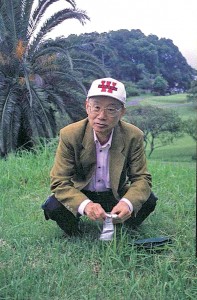OMURA, HONORARY PROFESSOR OF CHEMISTRY, WINS NOBEL IN MEDICINE


Satoshi Omura was awarded the Nobel Prize for Medicine for developing a new drug that has nearly eradicated river blindness and dramatically reduced mortality from other devastating diseases. Omura made the discovery that led to this drug while a visiting professor at Wesleyan in the early 1970s.
In 2005 Omura was appointed the first Max Tishler Professor of Chemistry, an honorary position. He returns to campus every few years to meet with faculty and present his current research.
The Nobel Committee honored Omura and William Campbell for discovering the drug Avermectin.
Omura came to Wesleyan in 1971 while on sabbatical from the Kitasato Institute in Tokyo, and worked closely with the late Emeritus University Professor of the Sciences Max Tishler for a year and a half. According to Albert Fry, the E.B. Nye Professor of Chemistry, who was a young professor here at the time, Omura brought to Wesleyan a number of extracts from soil samples to analyze their effects on harmful microorganisms.
“Within months after arriving here, he found a material (the microorganism Streptomyces avermitilis) that apparently was highly potent against a wide variety of bacteria, and quickly discovered that this was really a very attractive antibiotic,” Fry said.
Tishler, who joined Wesleyan’s faculty after retiring as senior vice president of research and development at the pharmaceutical company Merck & Co., introduced Omura to contacts at Merck, which developed the microorganism isolated by Omura into a powerful broad-spectrum antibiotic.
“This was one of the major discoveries that has happened at Wesleyan over the years,” Fry said. “So it was very exciting to see that develop from the initial discovery that Omura made into a product that has now saved many thousands of lives, particularly in Africa.”
In 1994 Wesleyan awarded Omura an honorary Doctor of Science. In 2001, Omura established an endowed fund for the department, which supports operations, equipment, and the work of junior faculty.
In addition, Paul Modrich, who collaborated on DNA mismatch repair research with Manju Hingorani, professor of molecular biology and biochemistry, received a 2015 Nobel Prize in Chemistry. Hingorani, postdoctoral researcher Miho Sakato, and Modrich co-authored a paper titled “MutL Traps MutS at a DNA Mismatch,” published in the July 21 issue of the Proceedings of the National Academy of Sciences (PNAS).
